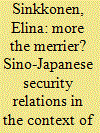| Srl | Item |
| 1 |
ID:
167635


|
|
|
|
|
| Summary/Abstract |
This paper analyses the evolution of Sino-Japanese rivalry in the security sphere concentrating on the Chinese perspective, and placing it within the wider context of complex interstate rivalry between China, Japan and the United States. From a theoretical viewpoint, this research contributes to the literature on interstate rivalry from multiparty perspective, which has been overlooked in existing research. China–Japan–US complex interstate rivalry includes elements of positional, spatial and ideological rivalry simultaneously. When rivalries mix two or more rivalry types, they become more difficult to resolve. The two broad trends of China’s military build-up and deepening US–Japan alliance evolve in tandem intensifying rivalry dynamics and increasing positional elements of rivalry. There are many indications on various levels that for China, controlling Japan’s international ambitions has become less important and more attention is paid to ways in which Japan helps the United States in reaching its objectives in Asia through their alliance agreement. The cases analysed to display complex interstate rivalry include the Taiwan question, territorial disputes in the East and South China Seas, and the North Korean nuclear issue.
|
|
|
|
|
|
|
|
|
|
|
|
|
|
|
|
| 2 |
ID:
124898


|
|
|
|
|
| Publication |
2013.
|
| Summary/Abstract |
Does empirical evidence support treating "nationalism" and "patriotism" as separate concepts in China and is there a relationship between strong nationalist/patriotic attitudes and foreign policy preferences? To analyse the construction of Chinese national identity, Chinese university students (N = 1346) took part in a survey in Beijing in spring 2007. The data supported the assumption of a conceptual separation between nationalism and patriotism. CCP members and students from rural backgrounds were more nationalistic than non-members and students with urban upbringings. Moreover, nationalism had a stronger link to foreign policy preferences than patriotism, and respondents with a greater degree of nationalism were less likely to favour international cooperation and more likely to prefer protectionist policies. The associations of nationalism and patriotism with foreign policy attitudes, and the contribution of other potential explanatory factors to the relationship between nationalism, patriotism and policy attitudes were explored with linear regression models.
|
|
|
|
|
|
|
|
|
|
|
|
|
|
|
|